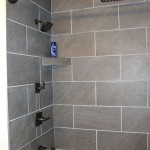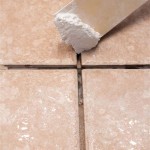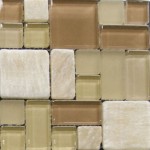Can You Use Mosaic Tile On Shower Walls? A Comprehensive Guide
Mosaic tile is a popular choice for homeowners looking to add visual interest and texture to their spaces. Its versatility allows for intricate designs and personalized aesthetics. One common application under consideration is the use of mosaic tile on shower walls. This article delves into the feasibility, advantages, disadvantages, and best practices associated with utilizing mosaic tile in shower environments.
Before proceeding, it is crucial to understand what defines mosaic tile. Generally, mosaic tiles are small pieces of material, such as ceramic, porcelain, glass, or stone, set onto a mesh backing to form a larger design. The small size of the individual tiles allows for greater design flexibility, enabling intricate patterns and curves not easily achievable with larger tile formats. However, this also presents unique installation and maintenance considerations, particularly within the moisture-rich environment of a shower.
Advantages of Using Mosaic Tile on Shower Walls
The aesthetic appeal of mosaic tile is undeniable. It adds a decorative element that can transform a simple shower into a visually stunning focal point. The availability of diverse materials, colors, and patterns allows for customization aligning perfectly with the desired bathroom aesthetic. From modern geometric designs to classic floral patterns, the design possibilities are extensive.
Beyond aesthetics, the small size of mosaic tiles offers practical advantages. The increased number of grout lines inherent in mosaic tile installations enhances slip resistance. This is particularly beneficial in shower environments, where wet surfaces can pose a safety hazard. The grout lines provide a textured surface that offers more grip underfoot and contributes to a safer showering experience. This slip resistance is often a key consideration for homeowners concerned about safety, especially for individuals with mobility issues or families with young children.
Mosaic tile can also be used to highlight specific areas within the shower. For example, a strip of mosaic tile can be incorporated as an accent border, drawing attention to a particular feature or complementing the overall design. It can also be used to define niches or shelves, adding both visual interest and functionality to the shower space. This targeted application allows for creative design choices without necessarily requiring complete coverage of the walls with mosaic tile, potentially saving on material costs and installation time.
Furthermore, certain types of mosaic tile, such as glass mosaic, are non-porous. This characteristic makes them inherently resistant to water absorption, preventing mold and mildew growth, which are common concerns in shower environments. This resistance simplifies cleaning and maintenance, contributing to the long-term durability and hygiene of the shower installation. However, the grout lines, even with proper sealing, are still susceptible to moisture penetration, requiring regular maintenance and cleaning.
Disadvantages and Challenges of Mosaic Tile in Shower Environments
While mosaic tile offers numerous advantages, there are also potential drawbacks to consider. The primary concern revolves around the increased number of grout lines. Grout, by its nature, is more porous than the tile itself, making it susceptible to water absorption, staining, and mold growth. Proper sealing of the grout is essential to minimize these risks. However, even with diligent sealing, periodic re-sealing is required to maintain its effectiveness. Neglecting this maintenance can lead to water damage, discoloration, and ultimately, the need for costly repairs.
The installation of mosaic tile can also be more labor-intensive compared to larger tile formats. The small size of the individual tiles requires meticulous alignment and precise installation to ensure a uniform and visually appealing finish. Improper installation can result in uneven surfaces, misaligned grout lines, and a generally unprofessional appearance. Therefore, it is crucial to engage a skilled and experienced tile installer familiar with the specific challenges of working with mosaic tile. This expertise ensures that the tile is properly adhered to the substrate, the grout lines are consistent, and the overall installation is watertight.
The cost of mosaic tile, both in terms of materials and installation, can be higher than that of larger format tiles. The intricate designs and specialized installation techniques often command a premium price. Different materials, such as glass or natural stone, further contribute to the overall cost. Therefore, it is essential to carefully consider the budget and weigh the aesthetic benefits against the potential cost increases before making a decision. Obtaining multiple quotes from different contractors and comparing material prices can help in making an informed decision.
Another potential issue is the difficulty in cleaning and maintaining mosaic tile, particularly in areas prone to hard water stains or soap scum build-up. The numerous grout lines provide ample surface area for these deposits to accumulate, making cleaning a time-consuming and potentially frustrating task. Specialized cleaning products and tools, such as grout brushes, are often required to effectively remove these stains and maintain the tile's appearance. Regular cleaning and preventative measures, such as using a squeegee after each shower, can help minimize the build-up of these deposits.
Best Practices for Using Mosaic Tile on Shower Walls
The selection of appropriate materials is paramount for a successful mosaic tile shower installation. Porcelain or glass mosaic tiles are generally preferred due to their non-porous nature and resistance to water absorption. These materials are less susceptible to staining, mold growth, and water damage compared to more porous options like natural stone. If natural stone is desired, it is crucial to select a type that is specifically suitable for wet environments and to apply a high-quality sealant regularly.
Proper waterproofing is absolutely essential. Before installing any tile, the shower walls must be thoroughly waterproofed to prevent water from penetrating the substrate and causing structural damage. This typically involves applying a waterproofing membrane, such as a liquid membrane or a sheet membrane, to the shower walls. The membrane should extend beyond the shower area to ensure complete protection. Adhering to industry-standard waterproofing practices and consulting with a qualified professional is crucial to ensure the longevity and integrity of the shower installation.
Grout selection and sealing play a critical role in the performance and appearance of the mosaic tile installation. Epoxy grout is generally recommended for shower environments due to its superior water resistance and stain resistance compared to cementitious grout. Epoxy grout is also less prone to cracking and shrinking, providing a more durable and long-lasting seal. Regardless of the grout type used, it is essential to apply a high-quality grout sealer after the grout has cured. The sealer should be reapplied periodically, typically every one to two years, to maintain its effectiveness and prevent water penetration.
Regular cleaning and maintenance are essential for preserving the beauty and longevity of mosaic tile in a shower. Regular cleaning helps prevent the build-up of soap scum, hard water stains, and mold growth. Mild detergents specifically designed for tile and grout should be used to avoid damaging the tile or grout. A grout brush can be used to scrub the grout lines and remove stubborn stains. After each shower, using a squeegee to remove excess water from the tile surface can help prevent the formation of water spots and soap scum. Proper ventilation in the shower area is also important to minimize moisture build-up and prevent mold growth. This can be achieved by using a ventilation fan or opening a window after each shower.
In summary, utilizing mosaic tile on shower walls offers both aesthetic and functional advantages. However, the increased number of grout lines necessitates meticulous installation, thorough waterproofing, and diligent maintenance. By carefully considering these factors and adhering to best practices, homeowners can successfully incorporate mosaic tile into their shower designs, creating a visually appealing and durable space. Choosing the right materials, ensuring proper installation, and committing to regular maintenance are key to enjoying the benefits of mosaic tile in a shower environment for years to come.

How To Lay Mosaic Tiles In A Shower Diy Projects

How Tile Mosaics Can Transform Your Bathroom

Mosaic Shower Tile Photos Ideas

Tiles Talk Mosaic Bathroom Ideas Contemporary Perini

Remodeling A Bathroom With Mosaic Tile L Granite Transformations

Pro Secrets How To Design A Mosaic Wall For Bathroom Stone Tile Depot

Spotlight On Stylish Shower Tile Designs Mir Mosaic

Diy Like The Pros Glass Tile Installation Msi Surfaces

Gray Mosaic Tiles On Shower Accent Wall Transitional Bathroom

Blue Subway Glass Tile Backsplash Kitchen Bathroom Shower Wall Mosaic Tiles Cgmt2128
Related Posts








